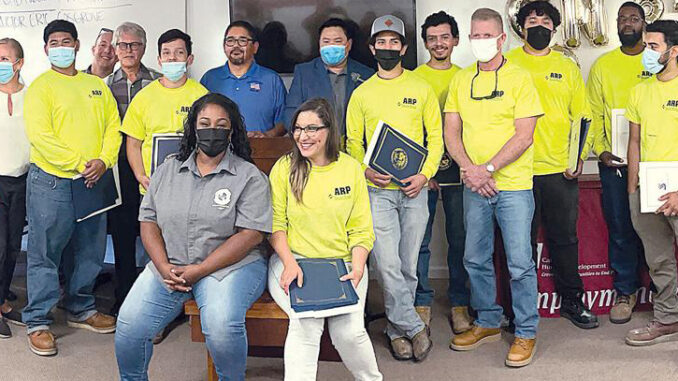
The first cohort of graduates from High Road Construction Careers SB1/MC3 Building Construction Apprenticeship Readiness program – also known as Valley Build – in San Joaquin County took place at California Human Development in Stockton on Friday.
Eleven county residents participated in the eight-week tuition-free program, where they learned the foundational skills for trades such as construction, iron working, plumbing and electrical. Graduates from the program received various certifications – including OSHA 10, blueprint reading, forklift and more – and will take the skills they’ve learned to enter into apprenticeship programs and build up their careers.
Valley Build currently spans to four Central Valley counties: Fresno, Kern, Merced and, the newest, San Joaquin County. It is spearheaded by California Human Development, in partnership with local labor organizations, including the San Joaquin Building Trades Council and San Joaquin County WorkNet. Now that the program has graduated its first group in the county, the next session is already scheduled to start this fall and the program is already in the recruitment phase for its next cohort.
“This is what we call the other four-year degree. So, a student comes to school here, they go into an apprenticeship program in the associated union they chose. In four years, they reach ‘journeyman scale,’” said Eric Cosgrove, building construction instructor for the program. “Currently, say the laborers union: their pay plus benefit package is about $58 an hour. After four years, they’re (the graduates) going to gross take home pay anywhere between $60,000- and-80,000-a-year with zero college debt.”
Kimball High School class of 2021 alumnus Jose Rocha seized the opportunity to be part of the county’s inaugural program as soon as he graduated. Rocha said he learned about the program through his mom who noticed the Valley Build program being shared on social media and saw it as great chance for him to get a jump start in the construction field, something he has been eyeing since high school.
“So she sent me the link, and then I applied to it, and they called me like the next weekend,” said Rocha. “It’s been good here because they teach us plumbing, electrical and carpentry. We also learned to do bricks and tile. So they taught us like a lot of stuff here.”
Since Rocha came straight from high school graduation, he missed out on having a traditional summer vacation. But he has no regrets.
“It’s good, because now I get a head start on my career and stuff instead of waiting and missing out on opportunities,” he said.
Moving on from Valley Build, Rocha is currently looking into labor apprenticeship positions and hopes to eventually move up to become an ironworker in building construction. He is one of three graduates who are from the Tracy area.
But just because these 11 graduates are now moving on to bigger and better things, it does not mean their connection to the Valley Build program severs upon completion. Students are encouraged to network with their peers and maintain relationships with their mentors down the road.
“I’ll say there are two ways in this. There’s a formal way, right? Where we actually do periodically touch base. ‘How are you doing? Where are you?’ But then the informal part is this guy,” said California Human Development CEO Thomas Stuebner as he motioned over to Cosgrove. “Everybody’s got his phone number. And in it, because of the relationships that are formed, they know they can call him, either because things are going great or because, ‘Hey, I’m getting ready to kind of shift jobs and would like your advice,’ or ‘Hey, you know what, there’s actually something I didn’t learn’…but that’s the idea too. We don’t just train them and drop them. It’s actually about a relationship.”
Those interested in signing up for the next Valley Build course in San Joaquin County can visit www.valleybuild.net and fill out the online form to be contacted by one of the program coordinators.
Rocha encourages anyone unsure about their career future and interested in trade crafts to apply for the program.
“I would say just to try it out. Because they teach us like a lot of different things here. I think we had around 14 union staff that came in and spoke to us to teach us about their trade,” he said. “Which is good, because, at first, I didn’t know about underground iron working and like all that stuff. So it taught me a lot of different trade jobs that I could apply to and eventually work at.”
• Contact Brianna Guillory at bguillory@tracypress.com or 209-830-4229.



Be the first to comment